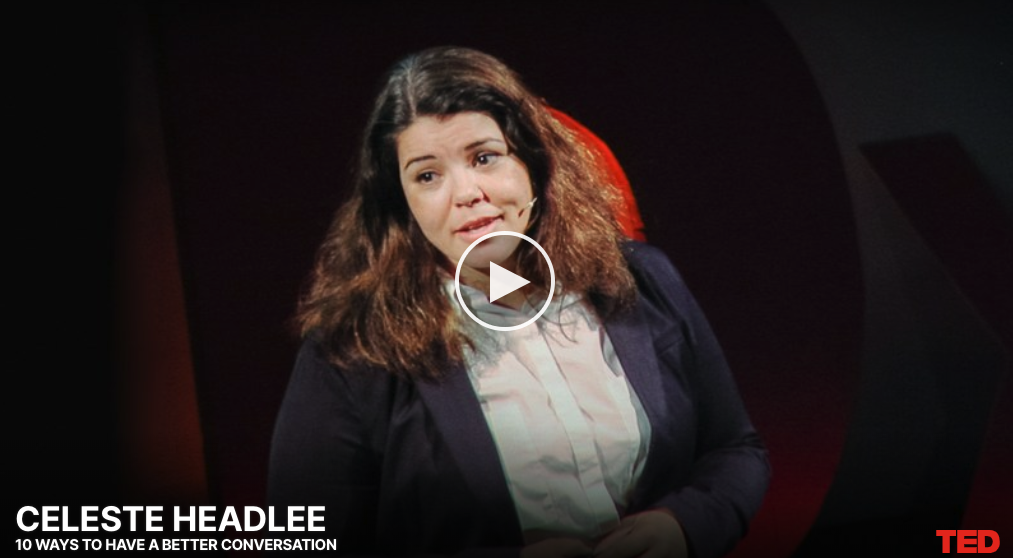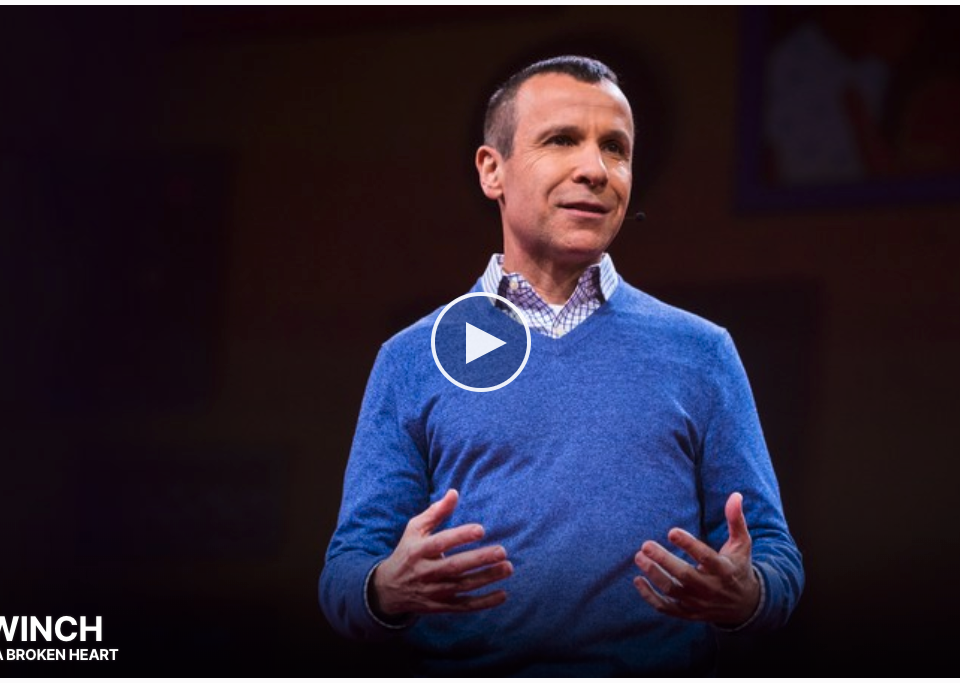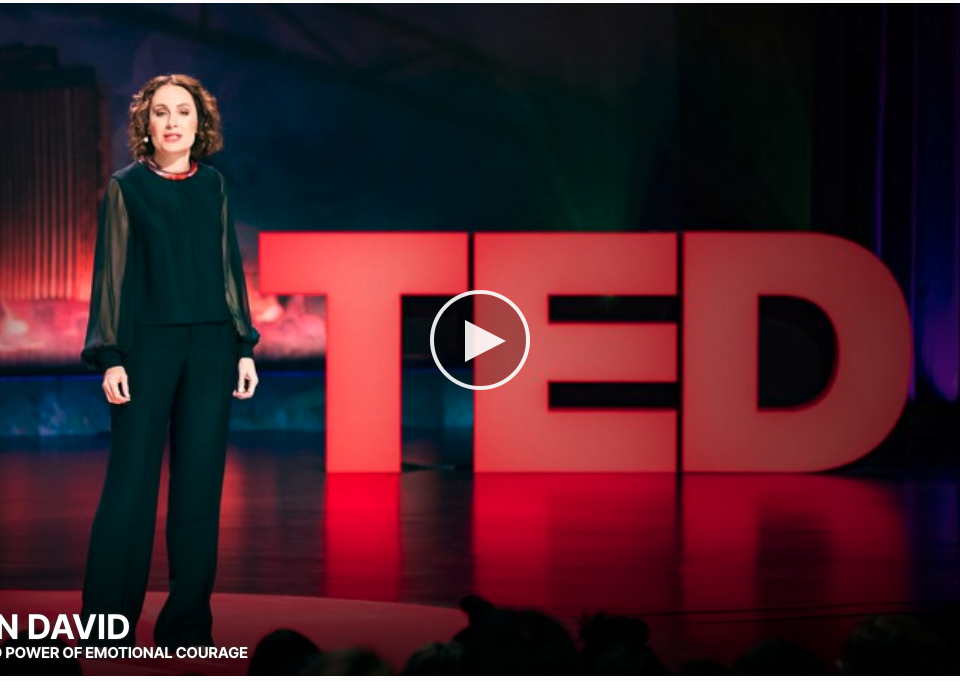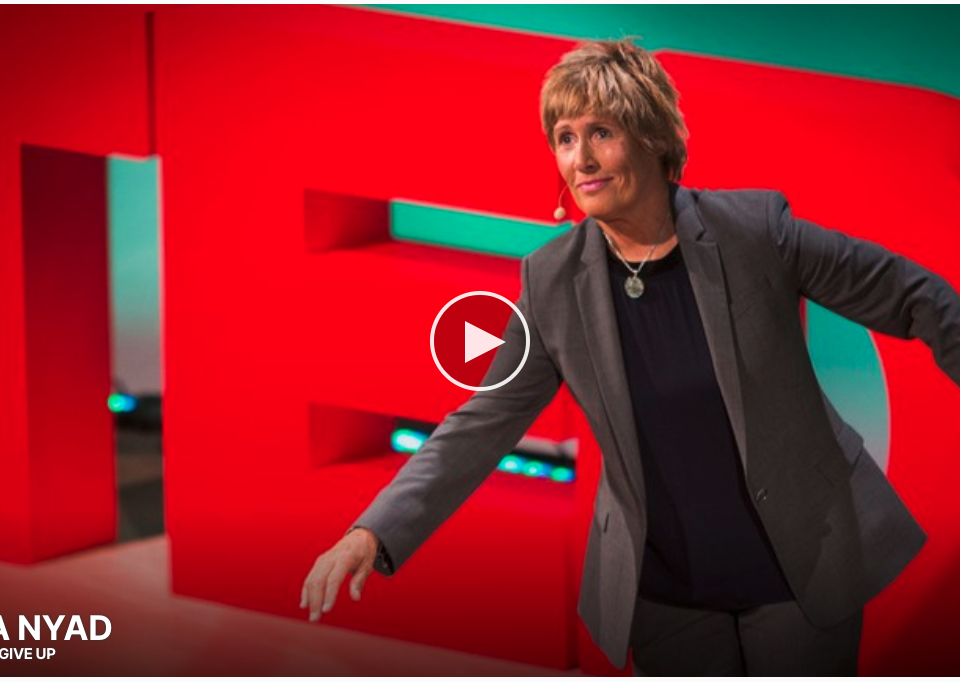
MARRIAGE IS GOOD FOR YOUR HEALTH
27 de novembro de 2019
Bad bosses can cause heart attacks
4 de dezembro de 2019All right, I want to see a show of hands: how many of you have unfriended someone on Faceboo kbecause they said something offensive about politics or religion, childcare, food?
And how many of you know at least one person that you avoid because you just don’t want to talk to them?
You know, it used to be that in order to have a polite conversation, we just had to follow the advice of Henry Higgins in “My Fair Lady”: Stick to the weather and your health. But these days, with climate change and anti-vaxxing, those subjects — are not safe either. So this world that we live in, this world in which every conversation has the potential to devolve into an argument, where our politicians can’t speak to one another and where even the most trivial of issues have someone fighting both passionately for it and against it, it’s not normal. Pew Research did a study of 10,000 American adults, and they found that at this moment, we are more polarized, we are more divided, than we ever have been in history. We’re less likely to compromise, which means we’re not listening to each other. And we make decisions about where to live, who to marry and even who our friends are going to be, based on what we already believe. Again, that means we’re not listening to each other. A conversation requires a balance between talking and listening, and somewhere along the way, we lost that balance.
Now, part of that is due to technology. The smartphones that you all either have in your hands or close enough that you could grab them really quickly. According to Pew Research, about a third of American teenagers send more than a hundred texts a day. And many of them, almost most of them, are more likely to text their friends than they are to talk to them face to face. There’s this great piece in The Atlantic. It was written by a high school teacher named Paul Barnwell. And he gave his kids a communication project. He wanted to teach them how to speak on a specific subject without using notes. And he said this: “I came to realize…”
“I came to realize that conversational competence might be the single most overlooked skill we fail to teach. Kids spend hours each day engaging with ideas and each other through screens, but rarely do they have an opportunity to hone their interpersonal communications skills. It might sound like a funny question, but we have to ask ourselves: Is there any 21st-century skill more important than being able to sustain coherent, confident conversation?”
Now, I make my living talking to people: Nobel Prize winners, truck drivers, billionaires, kindergarten teachers, heads of state, plumbers. I talk to people that I like. I talk to people that I don’t like. I talk to some people that I disagree with deeply on a personal level. But I still have a great conversation with them. So I’d like to spend the next 10 minutes or so teaching you how to talk and how to listen.
Many of you have already heard a lot of advice on this, things like look the person in the eye, think of interesting topics to discuss in advance, look, nod and smile to show that you’re paying attention,repeat back what you just heard or summarize it. So I want you to forget all of that. It is crap.
There is no reason to learn how to show you’re paying attention if you are in fact paying attention.
Now, I actually use the exact same skills as a professional interviewer that I do in regular life. So, I’m going to teach you how to interview people, and that’s actually going to help you learn how to be better conversationalists. Learn to have a conversation without wasting your time, without getting bored, and, please God, without offending anybody.
We’ve all had really great conversations. We’ve had them before. We know what it’s like. The kind of conversation where you walk away feeling engaged and inspired, or where you feel like you’ve made a real connection or you’ve been perfectly understood. There is no reason why most of your interactions can’t be like that.
So I have 10 basic rules. I’m going to walk you through all of them, but honestly, if you just choose one of them and master it, you’ll already enjoy better conversations.
Number one: Don’t multitask. And I don’t mean just set down your cell phone or your tablet or your car keys or whatever is in your hand. I mean, be present. Be in that moment. Don’t think about your argument you had with your boss. Don’t think about what you’re going to have for dinner. If you want to get out of the conversation, get out of the conversation, but don’t be half in it and half out of it.
Number two: Don’t pontificate. If you want to state your opinion without any opportunity for response or argument or pushback or growth, write a blog.
Now, there’s a really good reason why I don’t allow pundits on my show: Because they’re really boring. If they’re conservative, they’re going to hate Obama and food stamps and abortion. If they’re liberal, they’re going to hate big banks and oil corporations and Dick Cheney. Totally predictable. And you don’t want to be like that. You need to enter every conversation assuming that you have something to learn. The famed therapist M. Scott Peck said that true listening requires a setting aside of oneself. And sometimes that means setting aside your personal opinion. He said that sensing this acceptance, the speaker will become less and less vulnerable and more and more likely to open up the inner recesses of his or her mind to the listener. Again, assume that you have something to learn.
Bill Nye: “Everyone you will ever meet knows something that you don’t.” I put it this way: Everybody is an expert in something.
Number three: Use open-ended questions. In this case, take a cue from journalists. Start your questions with who, what, when, where, why or how. If you put in a complicated question, you’re going to get a simple answer out. If I ask you, “Were you terrified?” you’re going to respond to the most powerful word in that sentence, which is “terrified,” and the answer is “Yes, I was” or “No, I wasn’t.” “Were you angry?” “Yes, I was very angry.” Let them describe it. They’re the ones that know.Try asking them things like, “What was that like?” “How did that feel?” Because then they might have to stop for a moment and think about it, and you’re going to get a much more interesting response.
Number four: Go with the flow. That means thoughts will come into your mind and you need to let them go out of your mind. We’ve heard interviews often in which a guest is talking for several minutesand then the host comes back in and asks a question which seems like it comes out of nowhere, or it’s already been answered. That means the host probably stopped listening two minutes agobecause he thought of this really clever question, and he was just bound and determined to say that.And we do the exact same thing. We’re sitting there having a conversation with someone, and then we remember that time that we met Hugh Jackman in a coffee shop.
And we stop listening. Stories and ideas are going to come to you. You need to let them come and let them go.
Number five: If you don’t know, say that you don’t know. Now, people on the radio, especially on NPR, are much more aware that they’re going on the record, and so they’re more careful about what they claim to be an expert in and what they claim to know for sure. Do that. Err on the side of caution.Talk should not be cheap.
Number six: Don’t equate your experience with theirs. If they’re talking about having lost a family member, don’t start talking about the time you lost a family member. If they’re talking about the trouble they’re having at work, don’t tell them about how much you hate your job. It’s not the same. It is never the same. All experiences are individual. And, more importantly, it is not about you. You don’t need to take that moment to prove how amazing you are or how much you’ve suffered. Somebody asked Stephen Hawking once what his IQ was, and he said, “I have no idea. People who brag about their IQs are losers.”
Conversations are not a promotional opportunity.
Number seven: Try not to repeat yourself. It’s condescending, and it’s really boring, and we tend to do it a lot. Especially in work conversations or in conversations with our kids, we have a point to make, so we just keep rephrasing it over and over. Don’t do that.
Number eight: Stay out of the weeds. Frankly, people don’t care about the years, the names, the dates, all those details that you’re struggling to come up with in your mind. They don’t care. What they care about is you. They care about what you’re like, what you have in common. So forget the details. Leave them out.
Number nine: This is not the last one, but it is the most important one. Listen. I cannot tell you how many really important people have said that listening is perhaps the most, the number one most important skill that you could develop. Buddha said, and I’m paraphrasing, “If your mouth is open, you’re not learning.” And Calvin Coolidge said, “No man ever listened his way out of a job.”
Why do we not listen to each other? Number one, we’d rather talk. When I’m talking, I’m in control. I don’t have to hear anything I’m not interested in. I’m the center of attention. I can bolster my own identity. But there’s another reason: We get distracted. The average person talks at about 225 word per minute, but we can listen at up to 500 words per minute. So our minds are filling in those other 275 words. And look, I know, it takes effort and energy to actually pay attention to someone, but if you can’t do that, you’re not in a conversation. You’re just two people shouting out barely related sentences in the same place.
You have to listen to one another. Stephen Covey said it very beautifully. He said, “Most of us don’t listen with the intent to understand. We listen with the intent to reply.”
One more rule, number 10, and it’s this one: Be brief.
[A good conversation is like a miniskirt; short enough to retain interest, but long enough to cover the subject. — My Sister]
All of this boils down to the same basic concept, and it is this one: Be interested in other people.
You know, I grew up with a very famous grandfather, and there was kind of a ritual in my home. People would come over to talk to my grandparents, and after they would leave, my mother would come over to us, and she’d say, “Do you know who that was? She was the runner-up to Miss America. He was the mayor of Sacramento. She won a Pulitzer Prize. He’s a Russian ballet dancer.”And I kind of grew up assuming everyone has some hidden, amazing thing about them. And honestly, I think it’s what makes me a better host. I keep my mouth shut as often as I possibly can, I keep my mind open, and I’m always prepared to be amazed, and I’m never disappointed.
You do the same thing. Go out, talk to people, listen to people, and, most importantly, be prepared to be amazed.
Thanks.
Texto em Português:
Muito bem, vamos levantar as mãos: quantos de vocês excluíram alguém no Facebook porque a pessoa disse algo ofensivo sobre política ou religião, ou criação dos filhos, alimentação?
E quantos aqui têm pelo menos uma pessoa a quem evitam simplesmente porque não querem conversar com ela?
Antigamente, para se ter uma conversa civilizada, tínhamos apenas de seguir o conselho de Henry Higgins em “My Fair Lady”: “Fale do tempo e de sua saúde”. Mas, hoje, com a mudança climática e o movimento antivacina, esses assuntos não são mais seguros. Portanto, este mundo em que vivemos, um mundo em que toda conversa tem o potencial para se tornar uma discussão, onde os políticos não conversam uns com os outros, e onde até as questões mais triviais geram polarizações passionais tanto a favor quanto contra, não é normal. Pew Research fez um estudo com 10 mil americanos adultos e descobriu que, neste momento, estamos mais polarizados, estamos mais divididos, do que jamais estivemos na história.Estamos menos propensos a ceder, o que significa que não ouvimos uns aos outros e que tomamos decisões sobre onde viver, com quem nos casar e até como escolher nossos amigos baseados naquilo em que já acreditamos. De novo, isso significa que não estamos ouvindo uns aos outros. Conversar requer um equilíbrio entre falar e ouvir e, em algum momento, perdemos esse equilíbrio.
Em parte, isso se deve à tecnologia. Os smartphones que todos têm nas mãos, ou próximos o bastante para agarrá-los bem depressa. Segundo Pew Research, cerca de 33% dos adolescentes americanos enviam mais de 100 mensagens por dia. E é provável que quase a maioria deles prefira enviar mensagens aos amigos a conversar com eles pessoalmente. “The Atlantic” tem um artigo excelente de Paul Barnwell, um professor do ensino médio. Ele deu a seus alunos um trabalho de comunicação. Ele queria ensiná-los a falar sobre um tema específico sem usar anotações. E ele fala o seguinte: “Comecei a perceber…
Comecei a perceber que a competência conversacional deve ser a competência mais negligenciada que deixamos de ensinar. Os jovens passam horas todo dia lidando com ideias e pessoas através de telas, mas raramente têm a oportunidade de aprimorar suas habilidades de comunicação interpessoal. Pode soar como uma questão engraçada, mas temos de nos perguntar: “Existe uma habilidade mais importante no século 21 do que ser capaz de manter uma conversa coerente e tranquila?”
Meu ganha-pão é conversar com as pessoas: ganhadores do Nobel, caminhoneiros, bilionários, professores de jardim de infância, chefes de estado, encanadores. Converso com gente de quem gosto e com gente de quem não gosto. Falo com pessoas de quem discordo profunda e pessoalmente. E, ainda assim, tenho uma ótima conversa com eles. Por isso, gostaria de passar os próximos dez minutos ensinando como falar e como ouvir.
Muitos aqui já ouviram montes de conselhos sobre isso, coisas como “olhe nos olhos da pessoa, pense com antecedência em tópicos interessantes para discutir, encare, balance a cabeça e sorria para mostrar que está prestando atenção, repita ou resuma de volta o que acabou de ouvir”. Pois quero que esqueçam tudo isso. É tudo papo-furado.
Não há por que aprender a mostrar que estão prestando atenção se você estiver prestando atenção de fato.
Como entrevistadora profissional, uso exatamente as mesmas habilidades que uso em minha vida pessoal. Portanto, vou lhes ensinar como entrevistar pessoas, e isso, na verdade, vai ajudá-los a serem melhores “conversadores”. Aprender a ter uma conversa sem desperdiçar seu tempo, sem ficar entediado e, pelo amor de Deus, sem ofender ninguém.
Todos nós já tivemos ótimas conversas. Já as tivemos antes; sabemos como é. O tipo de conversa da qual você sai se sentindo envolvido e inspirado, ou que houve uma conexão real, ou que foi perfeitamente compreendido. Não há razão para que a maioria das interações não seja assim.
Assim, tenho dez regras básicas. Vou passar uma a uma com vocês, mas, honestamente, se escolherem dominar apenas uma delas, já vão conseguir ter conversas melhores.
Número um: não seja multitarefa. E não falo só de deixar o celular de lado, o tablet ou as chaves do carro, ou o que tiver nas mãos. Quero dizer: esteja presente. Esteja naquele momento. Não fique pensando na discussão que teve com o chefe. Não pense no que vai comer no jantar. Se quiser sair da conversa, simplesmente saia da conversa, mas não fiquem metade dentro e metade fora dela.
Número dois: não fique dando lição. Se quiser dar sua opinião sem qualquer oportunidade para reação ou discussão, objeção ou evolução, escreva um blogue.
Há uma razão pela qual não permito analistas políticos em meu programa: porque eles são muito chatos. Se forem conservadores, vão odiar Obama, vale-refeição e aborto. Se forem liberais, vão odiar os grandes bancos, as companhias de petróleo e Dick Cheney. Totalmente previsíveis. E quem quer ser assim? Vocês precisam entrar numa conversa acreditando que têm algo a aprender. O famoso terapeuta M. Scott Peck disse que a escuta verdadeira requer deixar de lado a si mesmo. E, às vezes, isso significa deixar de lado sua opinião pessoal. Ele disse que, ao sentir essa aceitação, o locutor vai se sentir cada vez menos vulnerável e mais propenso a abrir os recônditos de sua mente para o ouvinte. De novo, partam do pressuposto de que têm algo a aprender.
Bill Nye: “Todos que você vai conhecer na sua vida sabem algo que você não sabe”. Eu vejo dessa forma: todo mundo é especialista em alguma coisa.
Número três: faça perguntas abertas. Neste caso, use uma dica dos jornalistas: comece as perguntas com “quem, o quê, quando, onde, por quê ou como”. Se você fizer uma pergunta complicada, vai receber uma resposta simples. Se eu perguntar: “Você ficou apavorado?”, você vai reagir à palavra mais poderosa da sentença, que é “apavorado”, e a resposta é “Sim, fiquei.” ou “Não, não fiquei.”.”Você estava com raiva?” “Sim, com muita raiva.” Deixe-os descrever; são eles que sabem. Tente perguntar coisas assim: “Como é que foi aquilo?” “Como foi passar por isso?” Porque assim eles vão ter de parar por um momento e pensar no assunto, e você vai obter uma resposta muito mais interessante.
Número quatro: deixe fluir. Isso significa que pensamentos vão surgir na sua mente e você precisa deixá-los passar. Frequentemente assistimos a entrevistas nas quais o convidado está falando por vários minutos e, aí, o entrevistador vira e faz uma pergunta que parece que veio do nada, ou que já foi respondida. Significa que o entrevistador provavelmente parou de ouvir, pois pensou numa pergunta realmente inteligente, e ele estava decidido a falar aquilo. E nós fazemos exatamente o mesmo. Sentamos para conversar com alguém e daí lembramos da vez que vimos Hugh Jackman num café.
E aí paramos de ouvir. Histórias e ideias vão vir até você. Você precisa deixá-las vir e deixá-las ir.
Número cinco: se você não sabe, diga que não sabe. As pessoas no rádio, especialmente na rádio NPR, têm plena ciência de que fica tudo gravado, então são cuidadosas antes de afirmar que são especialistas em algo ou afirmar que sabem algo com certeza. Façam isso. Melhor pecar pelo excesso de cautela. As palavras deveriam ter mais valor.
Número seis: não compare sua experiência com a deles. Se eles estiverem falando sobre a perda de um familiar, não comece a falar sobre quando você perdeu um familiar. Se estiverem falando sobre problemas no trabalho, não diga a eles o quanto você odeia seu emprego. Não é o mesmo. Nunca é.Todas as experiências são individuais. E, mais importante ainda, não se trata de você. Não precisa pegar aquele momento para provar como você é incrível ou quanto você sofreu. Uma vez perguntaram a Stephen Hawking qual era seu QI, e ele disse: “Não tenho a menor ideia. Pessoas que se gabam de seu QI são fracassadas”.
Conversar não é uma oportunidade de autopromoção. [- Como vai? – Leia meu blogue!}
Número sete: tente não ser repetitivo. É paternalista e realmente muito chato. E tendemos a fazer isso demais. Especialmente em conversas no trabalho ou com nossos filhos, temos de fazer valer nosso ponto de vista, daí nós o repetimos sem parar. Não façam isso.
Número oito: passem longe dos pormenores. Francamente, as pessoas não ligam para os anos, os nomes, as datas, todos esses detalhes que você está lutando para se lembrar. Elas não ligam. Elas ligam para você. Elas ligam para como você é, o que vocês têm em comum. Então, esqueça os detalhes. Deixe-os de fora.
Número nove: esta não é a última, mas é a mais importante. Ouçam. Nem sei dizer quantas pessoas realmente importantes já disseram que ouvir talvez seja a habilidade mais importante que podemos desenvolver. Buddha disse, e vou parafraseá-lo: “Se sua boca estiver aberta, você não está aprendendo”. E Calvin Coolidge disse: “Ninguém nunca perdeu o emprego por saber ouvir”.
Por que não ouvimos uns aos outros? Número um: preferimos falar. Quando estou falando, estou no controle. Não tenho de ouvir algo que não me interessa. Sou o centro das atenções. Posso reforçar minha própria identidade. Mas há uma outra razão: a gente se distrai. A pessoa média fala cerca de 225 palavras por minuto, mas podemos ouvir até 500 palavras por minuto. Portanto, nossa mente está completando essas outras 275 palavras. E eu sei muito bem que exige esforço e energiarealmente prestar atenção em outra pessoa, mas, se não consegue fazer isso, você não está numa conversa. São apenas duas pessoas bradando sentenças desconexas no mesmo lugar.
Temos de ouvir uns aos outros. Stephen Covey disse isso lindamente. Ele disse: “A maioria de nós não ouve com a intenção de entender. Ouvirmos com a intenção de responder”.
A regra número dez é a seguinte: seja breve.
[Uma boa conversa é como uma minissaia; curta o bastante para manter o interesse, mas longa o suficiente para cobrir o assunto. – Minha irmã]
Tudo isso se resume ao mesmo conceito básico, que é o seguinte: estar interessado nas outras pessoas.
Cresci com um avô muito famoso, e havia um tipo de ritual em nossa casa. As pessoas vinham conversar com meus avós e, depois que iam embora, minha mãe vinha e dizia: “Sabem quem era aquela pessoa? Ela tirou o segundo lugar no Miss América. Ele é o prefeito de Sacramento. Ela ganhou o prêmio Pulitzer. Ele é bailarino do balé russo”. Eu cresci meio que supondo que todo mundo tem algo escondido e incrível. E, honestamente, acho que isso fez de mim uma entrevistadora melhor. Mantenho minha boca fechada o máximo que posso, mantenho minha mente aberta e sempre estou preparada para me surpreender, e nunca fico desapontada.
Vocês façam a mesma coisa. Saiam, conversem com as pessoas, ouçam as pessoas e, mais importante ainda, preparem-se para se surpreenderem.
Obrigada.





